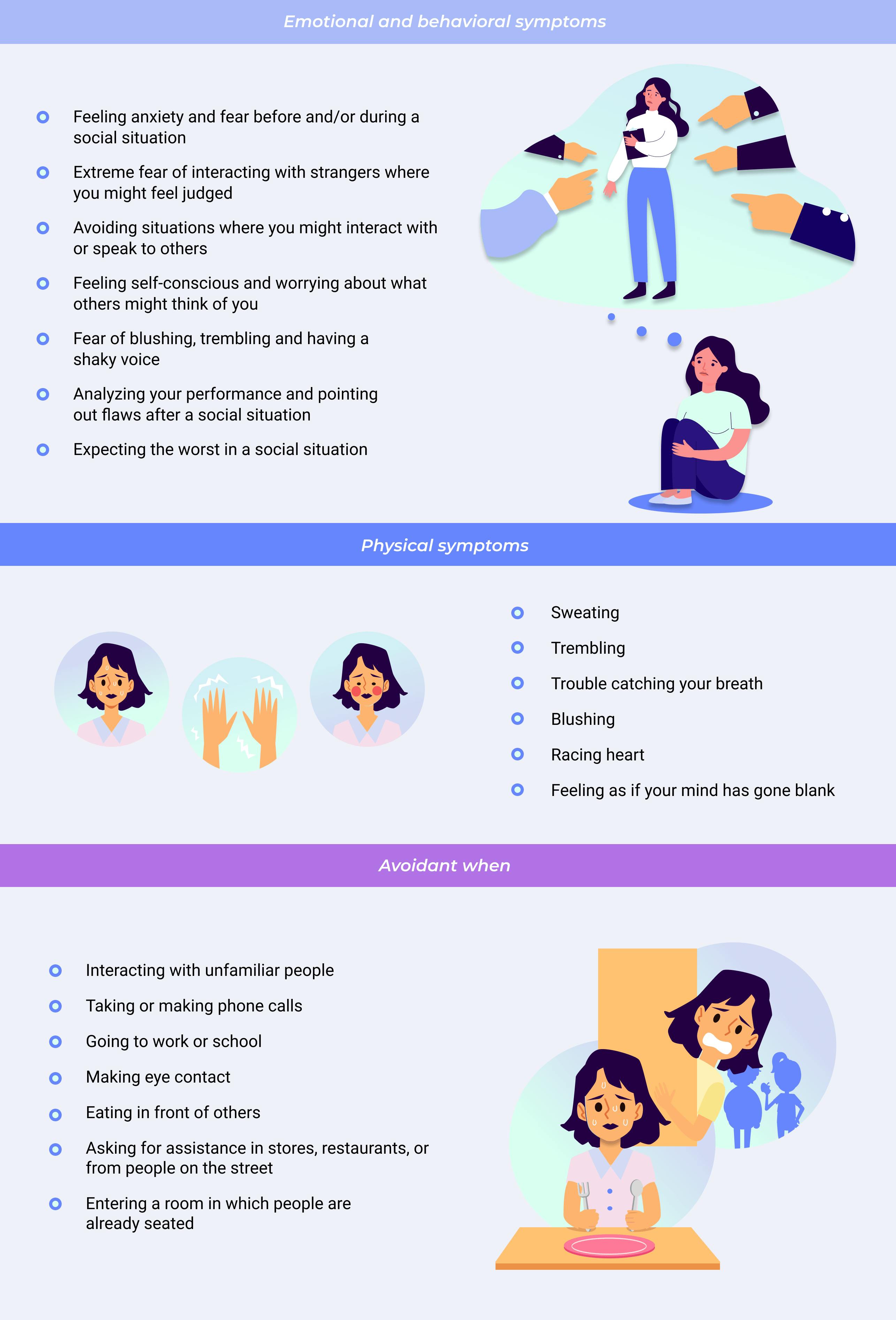Everyone's felt nervous in social situations before—whether it's on a first date or giving a presentation at work or at school—it's perfectly normal to feel butterflies in your stomach. But when this social nervousness causes an intense fear of judgment, self-consciousness, or embarrassment, and it begins to interfere with your daily routine, you may have social anxiety disorder (SAD or social phobia).
What is social anxiety disorder?
SAD (not to be confused with seasonal affective disorder) is the second most commonly diagnosed anxiety disorder, a chronic mental condition, affecting approximately 15 million American adults*. The onset of SAD usually occurs during the teenage years and comes from the fear of being judged or scrutinized. Without treatment, social anxiety disorder can last for years or even a lifetime and prevent an individual from reaching his or her full potential.
People with SAD are intensely afraid of appearing anxious, stupid, awkward, or boring to others, to the point that they might alter their patterns or schedule to avoid social situations. If they cannot avoid a situation, they may experience extreme anxiety and distress.
The differences between shyness and social anxiety order are:
- The intensity of fear and worry of rejection and embarrassment in social situations
- The level of avoidance of social situations (at work, school, or with strangers)
- The interference with relationships and performance (at work and school)
For example, an individual with SAD may worry about a social event for weeks and even months leading up to it, losing sleep, and potentially experiencing physical reactions of anxiety.
What are the symptoms of social anxiety disorder?
Let's take a moment to again recognize that feelings of shyness and discomfort in certain social settings are normal. SAD occurs when intense fear, anxiety, and avoidance of social situations start to interfere with daily life.

Social Anxiety Causes
- Genetics - Anxiety disorders tend to run in families. If your biological parents or siblings have SAD, you're more likely to develop the condition.
- Brain structure - An overactive amygdala will contribute to social anxiety and misreading others' behavior may contribute as well. For example, you might think someone is staring or frowning at you when they are not.
- Environment - Symptoms may develop after an unpleasant situation, modeling from parents, or as a reaction to controlling or overprotective parents. Children who experience ridicule, teasing, or rejection are more prone to develop the condition.
Social anxiety disorder typically starts during the teen years but can be triggered by new social or work demands like giving a speech in public or making an important work presentation.
How to tell if you have social anxiety disorder?
Diagnosing social anxiety disorder requires speaking with a mental health professional, who will do a screening and in-depth interview.
Initial screenings include the "Mini-Social Phobia Inventory" (Mini-SPIN), where the doctor will ask you to fill out a questionnaire. Your answers on the questionnaire will give you a score, and a high score may be indicative of SAD. However, only a licensed professional can diagnose after a full interview.
Additional diagnosis of social anxiety:
- Liebowitz Social Phobia Scale
- Fear of Negative Evaluation Scale
- Social Avoidance and Distress Scale
While screenings can be helpful in identifying possible problems, a diagnosis must be conducted by a mental health professional. Treatment is usually in the form of psychotherapy ("talk therapy"), medication, or both.
Medication for social anxiety disorder:
- Anti-anxiety medication
- Antidepressants - helpful when social anxiety disorder is severe
- Beta-blockers - relieves performance anxiety by controlling physical symptoms like shaking, sweating, and rapid heartbeat
What happens social anxiety disorder is left untreated?
Social phobia can last for years or for a lifetime if untreated. Because it impacts how people go about their daily lives at work or school, the avoidance and fear of social situations will eventually prevent people from reaching their full potential or even enjoying life.
Complications include:
- Critical / negative inner voice
- Difficulty being assertive
- Low self-esteem
- Poor social skills
- Hypersensitivity to criticism
- Low employment and academic achievement
- Substance abuse
Depression and other mental health disorders often occur with social anxiety disorder.
How to alleviate social anxiety?
We've seen that genetic and environmental factors may cause someone to develop social anxiety, but mindful and active steps to reduce symptoms can create progress:
- Seek professional help early - Coping skills learned in therapy or through medication can help with confidence and improve your ability to interact with others.
- Journal regularly - Writing about your feelings and your day will help you assess what is causing your stress, and you may then work to reduce that stressor.
- Prioritize your activities - Allocate your time to the most important activities and make time for things you enjoy. Protect your time and energy to reduce your anxiety.
- Avoid unhealthy substance use - Alcohol, drugs, and even caffeine can worsen anxiety.
Ultimately, early professional diagnosis and treatment are best for alleviating social anxiety disorder. An individual will see the results if they embrace the treatment with commitment and receive encouragement from loved ones.
----
Dr. Ho Anh
Chief Medical Officer at Cerebral
*https://adaa.org/understanding-anxiety/social-anxiety-disorder

Relationship Anxiety: Understand the Signs and Ways to Cope

Anxiety and Memory Loss

Experts Recommend Anxiety Screening for Those 19-65

Call 911 if you’re having a
mental health emergency
Text Home to 741-741 if you're in emotional
distress and need immediate support
Call or text 988 Suicide &
Crisis Lifeline. Chat service
is available at 988lifeline.org.